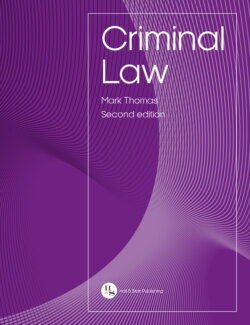Читать книгу Criminal Law - Mark Thomas - Страница 35
На сайте Литреса книга снята с продажи.
1.6.4.3 Judicial law making
ОглавлениеIt is essential to open this section by explaining that the role of judges and the courts is not to make law – it is to interpret law. Prior to the decision in Knuller v DPP [1973] AC 435, the appellate courts were understood as holding a power to create new criminal offences. In Knuller, however, the House of Lords renounced this power on the basis that any such changes should be made by Parliament.
Despite the decision in Knuller, many examples exist of the appellate courts exercising law-making powers. For instance, in R v R (Rape: Marital Exemption) [1992] 1 AC 599, the House of Lords took it upon itself to rule that non-consensual sexual intercourse within marriage should no longer be exempt from criminal liability. In essence, the House of Lords created a new offence of marital rape. I prefer to view R v R as more of a reflection of the gradual development of the common law. Indeed, this was the view taken by the ECtHR in CR v UK [1996] 1 FLR 434 upon a referral of R v R. The Court was of the view that, although Article 7 of the ECHR restricts and prevents the operation of retrospective laws, it does not prevent the evolution of the common law.
With the implementation of the Human Rights Act 1998, judicial law-making powers must now be read in accordance with their international obligations of consistency. As a result of the inherent change it was about to face, the House of Lords in C v DPP [1996] AC 1 gave the following guidance to judges (per Lord Lowry):
(1) If the solution is doubtful, the judges should beware of imposing their own remedy. (2) Caution should prevail if Parliament has rejected opportunities of clearing up a known difficulty or has legislated while leaving the difficulty untouched. (3) Disputed matters of social policy are less suitable areas for judicial interventions than purely legal problems. (4) Fundamental legal doctrines should not lightly be set aside. (5) Judges should not make change unless they can achieve finality and certainty.
